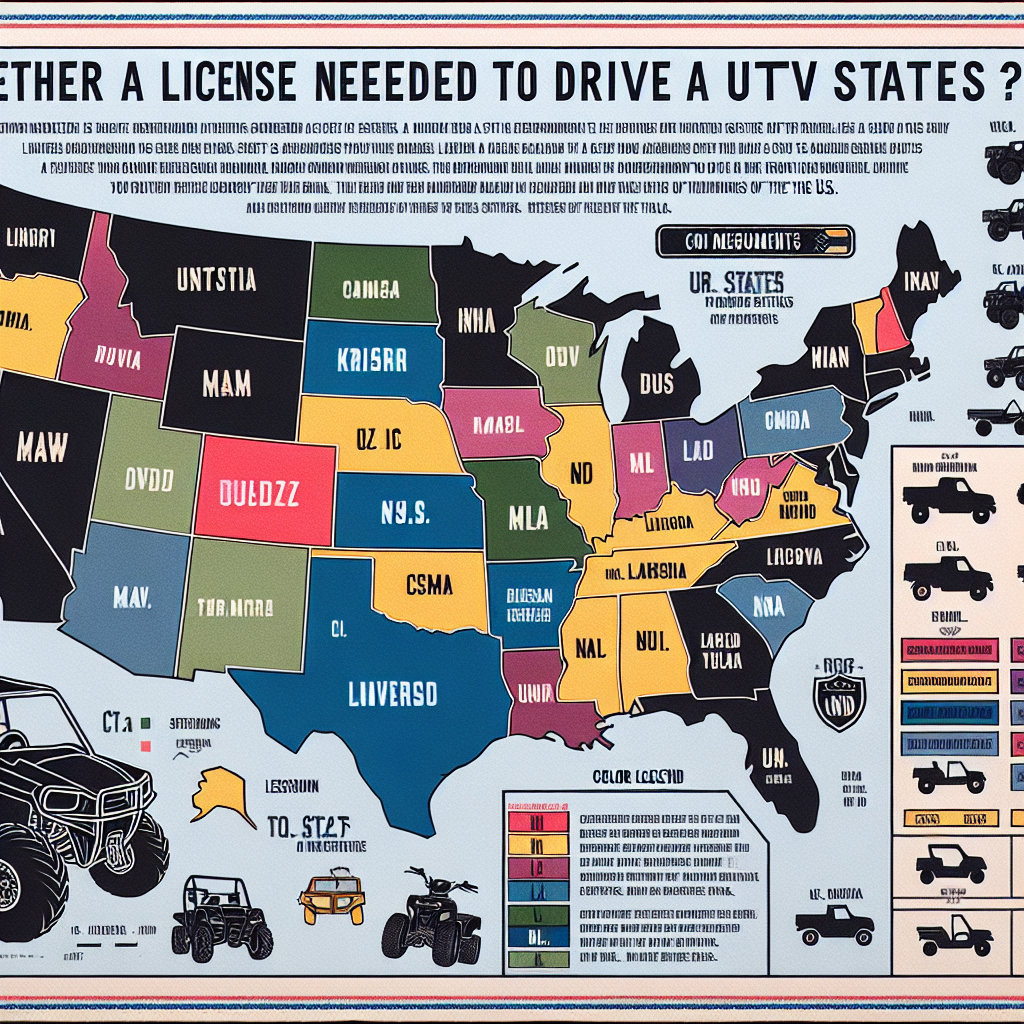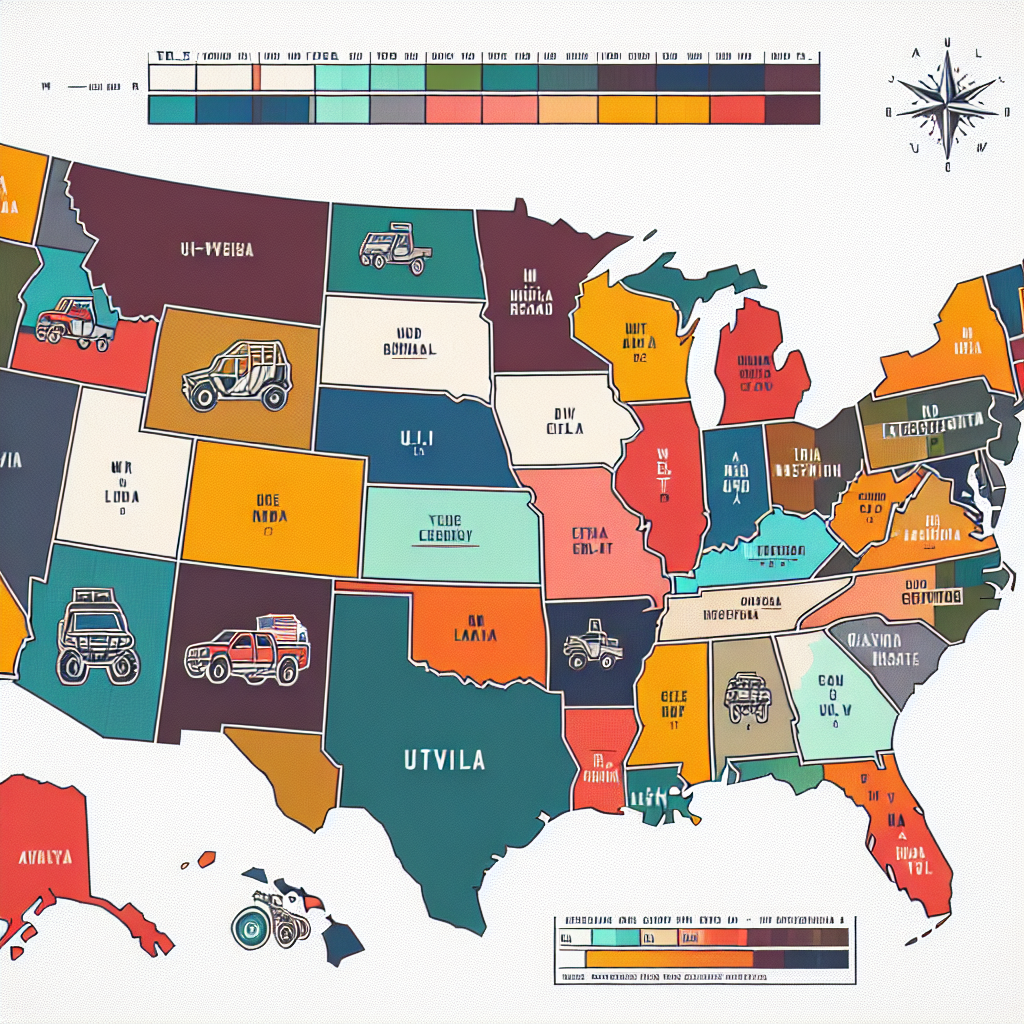Do I Need a License to Drive a UTV? State by State

-
Table of Contents
“Know Before You Go: UTV Licensing Requirements by State!”
When it comes to operating a Utility Task Vehicle (UTV), the requirements for licensing can vary significantly from state to state. UTVs, often used for recreational purposes, farming, and off-road adventures, may be subject to different regulations depending on local laws. Some states require drivers to possess a valid driver’s license, while others may have specific age restrictions or require a special permit for UTV operation. Understanding these regulations is crucial for ensuring compliance and safety while enjoying the versatility of UTVs. This guide will explore the licensing requirements for driving a UTV across various states, helping you navigate the legal landscape and make informed decisions.
UTV Licensing Requirements in California
In California, the licensing requirements for operating a Utility Task Vehicle (UTV) are governed by specific regulations that aim to ensure safety and compliance with state laws. UTVs, often referred to as side-by-sides, are versatile vehicles designed for off-road use, and their operation is subject to distinct rules compared to traditional automobiles. To begin with, it is essential to understand that California does not require a specific UTV license for individuals who wish to operate these vehicles on private property. However, when it comes to public lands and roadways, the regulations become more stringent.
For individuals planning to drive a UTV on public roads, it is crucial to note that the vehicle must be registered with the California Department of Motor Vehicles (DMV). This registration process involves ensuring that the UTV meets certain safety standards and is equipped with necessary features such as headlights, taillights, and turn signals. Additionally, the vehicle must have a valid license plate, which is issued upon successful registration. It is important to highlight that UTVs are classified as off-highway vehicles (OHVs) in California, and as such, they are primarily intended for use on designated trails and off-road areas rather than on public streets.
Moreover, while a specific UTV license is not mandated, operators must possess a valid driver’s license to legally operate the vehicle on public roads. This requirement underscores the importance of having a foundational understanding of road safety and traffic laws, which are essential for any driver. Furthermore, individuals under the age of 18 are required to complete a safety training course approved by the California State Parks Off-Highway Motor Vehicle Recreation Division. This course is designed to educate young drivers about safe operation practices, the importance of wearing helmets, and the responsibilities that come with driving a UTV.
In addition to licensing and registration, California has established specific age restrictions for UTV operators. Generally, individuals must be at least 16 years old to operate a UTV on public lands, although those younger than 16 may drive under certain conditions, such as being supervised by a licensed adult. This regulation aims to ensure that younger drivers are adequately guided and monitored, thereby promoting safety in off-road environments.
Furthermore, it is essential for UTV operators in California to be aware of local ordinances that may impose additional restrictions or requirements. Different counties and municipalities may have their own rules regarding where UTVs can be operated, and it is advisable for drivers to familiarize themselves with these regulations before venturing out. For instance, some areas may prohibit UTVs on specific trails or roads, while others may have designated routes for off-road vehicles.
In conclusion, while California does not require a specific UTV license for private property use, individuals must adhere to registration requirements and possess a valid driver’s license for public operation. Additionally, young drivers must complete a safety training course, and operators should remain informed about local regulations. By understanding and complying with these requirements, UTV enthusiasts can enjoy the diverse landscapes of California while ensuring their safety and the safety of others.
UTV Driving Regulations in Texas
In Texas, the regulations governing the operation of Utility Task Vehicles (UTVs) are designed to ensure safety while accommodating the diverse needs of recreational and agricultural users. As UTVs have gained popularity for both work and leisure, understanding the specific licensing requirements is essential for operators. In Texas, the law stipulates that individuals must possess a valid driver’s license to operate a UTV on public roads. This requirement aligns with the state’s commitment to maintaining safety standards on its roadways.
Moreover, it is important to note that Texas law categorizes UTVs as off-highway vehicles, which means they are primarily intended for use on unpaved surfaces. However, the state does allow for limited use of UTVs on public roads under certain conditions. For instance, local municipalities may establish ordinances that permit UTV operation on designated streets, provided that the vehicle is equipped with specific safety features. These features typically include headlights, taillights, turn signals, and a functioning horn, which are crucial for visibility and communication with other road users.
In addition to the requirement for a valid driver’s license, Texas law mandates that UTV operators must be at least 14 years old. However, individuals under the age of 18 are required to complete a safety course approved by the Texas Parks and Wildlife Department. This course is designed to educate young operators about safe driving practices, the importance of wearing helmets, and the responsibilities that come with operating a UTV. By implementing such measures, Texas aims to foster a culture of safety among younger drivers, thereby reducing the risk of accidents.
Furthermore, it is essential for UTV operators in Texas to be aware of the insurance requirements associated with their vehicles. While the state does not mandate insurance for UTVs used exclusively off-road, operators who intend to use their vehicles on public roads must carry liability insurance. This requirement serves to protect both the operator and other road users in the event of an accident. Consequently, it is advisable for UTV owners to consult with their insurance providers to ensure they have adequate coverage that meets state regulations.
As the popularity of UTVs continues to rise, local governments in Texas are increasingly recognizing the need to establish clear guidelines for their use. Some counties and cities have enacted specific ordinances that address where UTVs can be operated, the hours of operation, and additional safety measures. Therefore, it is prudent for UTV operators to familiarize themselves with local laws and regulations, as these can vary significantly from one jurisdiction to another. By doing so, operators can avoid potential fines and ensure a safe and enjoyable experience while driving their UTVs.
In conclusion, operating a UTV in Texas requires adherence to several regulations, including possessing a valid driver’s license, meeting age requirements, completing safety courses for younger drivers, and obtaining liability insurance when necessary. As UTVs are increasingly integrated into both recreational and agricultural activities, understanding these regulations is crucial for ensuring safety and compliance. By staying informed about state and local laws, UTV operators can enjoy the freedom and versatility that these vehicles offer while contributing to a safer driving environment for everyone.
UTV License Necessity in Florida
In Florida, the regulations surrounding the operation of Utility Task Vehicles (UTVs) are quite specific and vary depending on the context in which these vehicles are used. To begin with, it is essential to understand that UTVs, often referred to as side-by-sides, are designed for off-road use and are popular for recreational activities, agricultural tasks, and utility purposes. However, the necessity of a license to operate a UTV in Florida hinges on several factors, including the vehicle’s intended use, the age of the operator, and the location of operation.
For individuals planning to operate a UTV on public roads, it is crucial to note that Florida law requires certain conditions to be met. Specifically, UTVs must be registered with the Florida Department of Highway Safety and Motor Vehicles if they are to be driven on public streets. This registration process involves obtaining a title for the vehicle and ensuring that it meets specific safety standards. Additionally, operators must possess a valid driver’s license, as driving a UTV on public roads is treated similarly to operating a standard motor vehicle. This requirement underscores the importance of adhering to traffic laws and regulations, which are designed to ensure the safety of all road users.
Moreover, it is important to consider the age restrictions that apply to UTV operators in Florida. According to state law, individuals under the age of 16 are prohibited from operating a UTV on public roads unless they are accompanied by a licensed adult. This provision aims to enhance safety by ensuring that younger, less experienced drivers are supervised while navigating potentially hazardous road conditions. Consequently, parents and guardians should be aware of these regulations when allowing their children to operate UTVs, whether on public roads or private property.
In contrast, when UTVs are used exclusively for off-road purposes, such as on private land or designated off-road trails, the licensing requirements differ significantly. In these scenarios, operators are not required to possess a driver’s license, nor is there a need for vehicle registration. This flexibility allows for greater accessibility to UTVs for recreational use, particularly in rural areas where off-road driving is common. However, it is still advisable for operators to familiarize themselves with local laws and regulations, as some counties or municipalities may impose additional restrictions or requirements for off-road vehicle operation.
Furthermore, safety should always be a priority when operating a UTV, regardless of the licensing requirements. Wearing appropriate safety gear, such as helmets and seatbelts, can significantly reduce the risk of injury in the event of an accident. Additionally, operators should be educated about the vehicle’s capabilities and limitations, as well as the terrain they will be navigating. By prioritizing safety and adhering to the relevant regulations, UTV operators in Florida can enjoy their vehicles responsibly and legally.
In conclusion, whether a license is required to drive a UTV in Florida depends largely on the context of its use. For those operating on public roads, a valid driver’s license and vehicle registration are necessary, while off-road use offers more leniency regarding licensing. Regardless of the situation, understanding and complying with state laws is essential for ensuring a safe and enjoyable experience while operating a UTV in Florida.
Q&A
1. **Question:** Do I need a license to drive a UTV in California?
**Answer:** Yes, you need a valid driver’s license to operate a UTV on public roads in California.
2. **Question:** Is a license required to drive a UTV in Texas?
**Answer:** Yes, a valid driver’s license is required to operate a UTV on public roads in Texas.
3. **Question:** Do I need a license to drive a UTV in Florida?
**Answer:** Yes, you must have a valid driver’s license to operate a UTV on public roads in Florida.In conclusion, whether you need a license to drive a UTV varies significantly by state. Some states require a valid driver’s license, while others may allow individuals to operate UTVs without one, often imposing age restrictions or requiring safety courses. It is essential to check the specific regulations in your state to ensure compliance with local laws regarding UTV operation.





